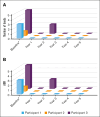Completion of phase 2b trial of etranacogene dezaparvovec gene therapy in patients with hemophilia B over 5 years
- PMID: 40188458
- PMCID: PMC12275190
- DOI: 10.1182/bloodadvances.2024015291
Completion of phase 2b trial of etranacogene dezaparvovec gene therapy in patients with hemophilia B over 5 years
Abstract
Etranacogene dezaparvovec (CSL222, formerly AMT-061) is a recombinant adeno-associated virus serotype 5 (AAV5) vector containing the highly active factor IX (FIX) Padua variant controlled by a liver-specific promoter. This phase 2b, open-label, single-dose, single-arm, multicenter trial evaluated the efficacy and safety of etranacogene dezaparvovec. Three adult participants with severe or moderately severe hemophilia B (FIX ≤2%) and AAV5-neutralizing antibodies received a single IV dose (2 × 1013 genome copies per kg) of etranacogene dezaparvovec. The primary end point of FIX activity ≥5 IU/dL at 6 weeks was met (mean, 30.6 IU/dL). Secondary end points included bleed frequency, FIX concentrate use, and adverse events. Here, we report the end-of-study 5-year outcomes. After administration, mean (range) FIX activity increased to 40.8 IU/dL (31.3-50.2) at year 1 and was maintained at 45.7 IU/dL (39.0-51.2) at year 5. Mean annualized bleeding rate (all bleeds) was 0.14 for the cumulative follow-up period years 0 to 5. Two participants had 5 bleed-free years after treatment. Per protocol, 1 participant received episodic FIX replacement therapy after treatment for elective surgeries, 2 bleeding episodes, and 2 single self-administered infusions for unreported reasons. All participants discontinued and remained free of FIX prophylaxis. During the 5-year study period, there were no clinically significant elevations in liver enzymes, requirement for steroids, FIX inhibitor development, thrombotic complications, or late-emergent safety events in any participant. Five years after administration, etranacogene dezaparvovec was effective in adults with hemophilia B with a favorable safety profile. Participants are eligible to participate in an extension study (ClinicalTrials.gov identifier: NCT05962398) for 10-year additional follow-up. This trial was registered at www.clinicaltrials.gov as #NCT03489291.
© 2025 American Society of Hematology. Published by Elsevier Inc. Licensed under Creative Commons Attribution-NonCommercial-NoDerivatives 4.0 International (CC BY-NC-ND 4.0), permitting only noncommercial, nonderivative use with attribution. All other rights reserved.
Conflict of interest statement
Conflict-of-interest disclosure: A.v.D. serves as a consultant for BioMarin, Regeneron, Pfizer, Bioverativ/Sanofi, Sobi, CSL Behring, Novo Nordisk, Pfizer, Spark Therapeutics, Takeda, Genentech, and uniQure; and is a cofounder and member of the board of directors of Hematherix LLC, a biotech company that is developing activated superFactor V therapy for bleeding complications. E.G. serves as a consultant for BioMarin, CSL Behring, and Genzyme. A.G. serves as a consultant for Bioverativ, Genentech/Roche, BioMarin, and uniQure; and reports a speaker bureau role with Bioverativ and Genentech/Roche. G.C. reports grant/research support from CSL Behring, Pfizer, and Sobi; and a speaker bureau role with Bayer, BioMarin, BIOVIIIx, CSL Behring, Roche, Sobi, Grifols, LFB Biopharmaceuticals, Novo Nordisk, Werfen, Kedrion, and uniQure. N.S.K. serves as a consultant for uniQure, BioMarin, and Novo Nordisk. S.U.L. serves as a consultant for uniQure. F.W.G.L. reports grant/research support from CSL Behring, Shire/Takeda, Roche, and Sobi; and serves as a consultant for uniQure, Takeda, Novo Nordisk, and BioMarin. W.A.M. reports grant/research support from Bayer, Biotest, Takeda, LFB Biopharmaceuticals, Octapharma, Novo Nordisk, Pfizer, and uniQure; and serves as a consultant for Bayer, BioMarin, Freeline, LFB Biopharmaceuticals, Octapharma, Novo Nordisk, Pfizer, and uniQure. M.R. reports research funding to employers from Bayer, BioMarin, CSL Behring, Genentech, Grifols, HEMA Biologics, LFB Biopharmaceuticals, Novo Nordisk, Octapharma, Pfizer, Sanofi, Spark Therapeutics, Takeda, and uniQure; serves as a consultant for Catalyst Biosciences, CSL Behring, Genentech, HEMA Biologics, Kedrion, Novo Nordisk, Pfizer, Sanofi, Takeda, and uniQure; and serves on the board of directors for Foundation for Women and Girls with Blood Disorders, Partners in Bleeding Disorders Education, and Thrombosis and Hemostasis Societies of North America. P.E.M. and S.L.Q. are employees of CSL Behring. S.W.P. reports grants/contracts from Siemens and YewSavin; reports consulting fees from ApcinteX/Centessa, ASC Therapeutics, Bayer, BioMarin, CSL Behring, Freeline, Genentech Inc/Roche, HEMA Biologics, LFB Biopharmaceuticals, Metagenomi, Novo Nordisk, Poseida Therapeutics, Precision BioSciences, Pfizer, Regeneron/Intellia, Sanofi, Spark Therapeutics Inc, Takeda, and uniQure; and has participated on the scientific advisory boards for GeneVentiv and Equilibra Bioscience.
Figures




Comment in
-
Getting closer to hemophilia gene therapy for all?Blood Adv. 2025 Jul 22;9(14):3629-3630. doi: 10.1182/bloodadvances.2025016642. Blood Adv. 2025. PMID: 40658442 Free PMC article. No abstract available.
References
-
- Srivastava A, Santagostino E, Dougall A, et al. WFH guidelines for the management of hemophilia, 3rd edition. Haemophilia. 2020;26(suppl 6):1–158. - PubMed
-
- Berntorp E, Fischer K, Hart DP, et al. Haemophilia. Nat Rev Dis Primers. 2021;7(1) - PubMed
-
- Mancuso ME, Mahlangu JN, Pipe SW. The changing treatment landscape in haemophilia: from standard half-life clotting factor concentrates to gene editing. Lancet. 2021;397(10274):630–640. - PubMed
-
- Castaman G. Gene transfer in hemophilia B: a big step forward. Bleeding Throm Vasc. Biology. 2023;2(2):70.
Publication types
MeSH terms
Substances
Associated data
LinkOut - more resources
Full Text Sources
Medical
Miscellaneous

